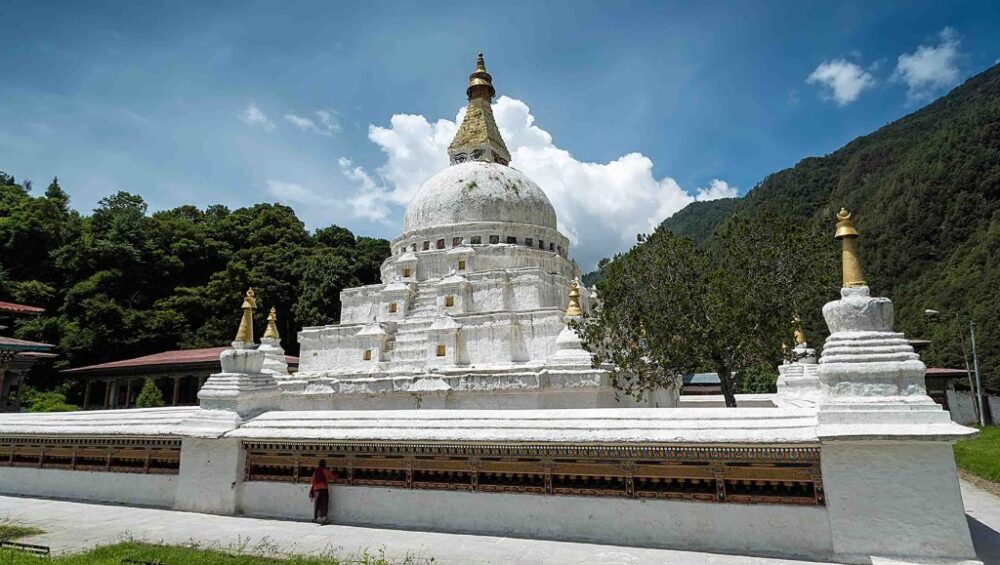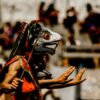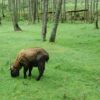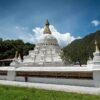Bhutan, the Land of Thunder Dragon is sandwiched between China in the North and India in the South. The country remained isolated for so many years despite the development in the neighboring countries. Long before Bhutan was known by several names like Lhomon ( Southern Darkness ) or Monyul ( Dark Land of Monpa). The name Lhomon Tsendhenjong which means Mon country of sandalwoods. Further, Bhutan was also know by the name Boo-Tan meaning the HighLanders by the Bristish people.
Until the rise of a single man to the power of King, Bhutan was disturbed with so many feuds and turmoils. It was in the year 1907, that the country was unanimously united and Sir Gongsa Ugyen Wangchuk became the first ever King of Bhutan. Thus, the peace began to change the landscape of Bhutan.
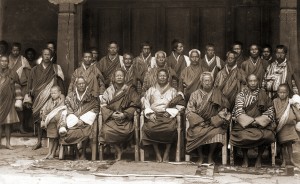
From thereon, Bhutan was ruled by successive Kings. The current King is the 5th King in line. The present King, King Jigme Singye Wangchuk and HH Azhi Jetsun Pema Wangchuk has given birth to a young crown Prince who will rule in succession to his father.
Until 2008, Bhutan was ruled by Kings and the system of governance was Monarchy. In the year 2008, the King announced the birth of Democracy in Bhutan. Thus, Bhutan was ruled by the political parties viz Druk Phuensum Tshogpa ( DPT) ruling the country in the very first 5 years term. However, the second election in 2013 gave the change in the ruling party, where People’s Democratic Party ( PDP ) ruled the country. The current Prime Minister of Bhutan is Lyonchen Tshering Tobgay.
Talking about the history, Bhutan had so many historic events like the arrival of Zhabdrung Ngawang Namgyel from Tibet in the year 1616. Guru Rimpochoe ( The Great Treasurer ) visited Bhutan in 746 AD, thus punishing all the evils in the Country. Bhutan thereby became a Buddhist Country practicing religions while there are other form of practices like Kagyupa, Nyingmapa and Hinduism.
People & Society

Bhutanese society is free of class or a caste system. Slavery was abolished by the Third King Jigme Dorji Wangchuck in the early 1950s through a royal edict. Though, a few organizations to empower women were established in the past Bhutanese society has always maintained relative gender equality. In general our nation is an open and a good-spirited society.
Living in Bhutanese society generally means understanding some accepted norms such as Driglam Namzha, the traditional code of etiquette. Driglam Namzha teaches people a code of conduct to adhere to as members of a respectful society. Examples of Driglam Namzha include wearing a traditional scarf (kabney) when visiting a Dzong or an office, letting the elders and the monks serve themselves first during meals, offering felicitation scarves during ceremonies such as marriages and promotions and politely greeting elders or seniors.
Normally, greetings are limited to saying “Kuzuzangpo” (hello) amongst equals. For seniors and elders, the Bhutanese bow their head a bit and say “kuzuzangpo la” (a more respectful greeting). Recently, shaking hands has become an accepted norm.
The Bhutanese are a fun-loving people fond of song and dance, friendly contests of archery, stone pitching, traditional darts, basketball and football. We are a social people that enjoy weddings, religious holidays and other events as the perfect opportunities to gather with friends and family.
The openness of Bhutanese society is exemplified in the way our people often visit their friends and relatives at any hour of the day without any advance notice or appointment and still receive a warm welcome and hospitality.

